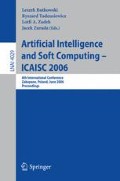Abstract
In the paper we develop a new method for designing and reduction of flexible neuro-fuzzy systems. The method allows to reduce number of discretization points in the defuzzifier, number of rules, number of inputs, and number of antecedents. The performance of our approach is illustrated on a typical benchmark.
Access this chapter
Tax calculation will be finalised at checkout
Purchases are for personal use only
Preview
Unable to display preview. Download preview PDF.
References
Cpalka, K., Rutkowski, L.: Neuro-Fuzzy Structures for Pattern Classification. WSEAS Trans. on Computers 4(7), 668–697 (2005)
Cpalka, K., Rutkowski, L.: Flexible Takagi-Sugeno Neuro-Fuzzy Structures for Nonlinear Approximation. WSEAS Trans. on Computers 9(4), 1450–1458 (2005)
Czogala, E., Leski, J.: Fuzzy and Neuro-Fuzzy Intelligent Systems, A Springer Verlag Company. Physica Verlag, Heidelberg (2000)
Fodor, C.: On fuzzy implication. Fuzzy Sets and Systems 42, 293–300 (1991)
Gorzalczany, M.: Computational Intelligence Systems and Applications: Neuro-Fuzzy and Fuzzy Neural Synergisms. Springer, Heidelberg (2002)
Klement, E.P., Mesiar, R., Pap, E.: Triangular Norms. Kluwer Academic Publishers, Netherlands (2000)
Nauck, D., Kruse, R.: Neuro-fuzzy systems for function approximation. Fuzzy Sets and Systems 101, 261–271 (1999)
Rutkowski, L.: Flexible Neuro-Fuzzy Systems. Kluwer Academic Publishers, Dordrecht (2004)
Rutkowski, L., Cpalka, K.: Designing and learning of adjustable quasi triangular norms with applications to neuro-fuzzy systems. IEEE Trans. on Fuzzy Systems 13, 140–151 (2005)
Rutkowski, L., Cpalka, K.: Flexible neuro-fuzzy systems. IEEE Transactions on Neural Networks 14, 554–574 (2003)
UCI respository of machine learning databases, Available online: http://ftp.ics.uci.edu/pub/machinelearningdatabases/
Wang, J.S., Lee, C.S.G.: Self adaptive neuro-fuzzy inference systems for classification applications. IEEE Trans. on Fuzzy Systems 10, 790–802 (2002)
Yager, R.R., Filev, D.P.: Essentials of fuzzy modelling and control. John Wiley & Sons, Chichester (1994)
Author information
Authors and Affiliations
Editor information
Editors and Affiliations
Rights and permissions
Copyright information
© 2006 Springer-Verlag Berlin Heidelberg
About this paper
Cite this paper
Cpalka, K. (2006). A Method for Designing Flexible Neuro-fuzzy Systems. In: Rutkowski, L., Tadeusiewicz, R., Zadeh, L.A., Żurada, J.M. (eds) Artificial Intelligence and Soft Computing – ICAISC 2006. ICAISC 2006. Lecture Notes in Computer Science(), vol 4029. Springer, Berlin, Heidelberg. https://doi.org/10.1007/11785231_23
Download citation
DOI: https://doi.org/10.1007/11785231_23
Publisher Name: Springer, Berlin, Heidelberg
Print ISBN: 978-3-540-35748-3
Online ISBN: 978-3-540-35750-6
eBook Packages: Computer ScienceComputer Science (R0)

